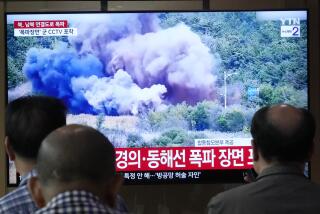Old Distrust Keeps Koreas Bitterly Split : Cold War: The failure of a free-travel plan is a reminder that animosity between the North and the South still runs deep.
- Share via
SEOUL — South Korea’s scheme to throw open its heavily fortified border with Communist North Korea this week--in a “grand inter-Korean exchange” of travelers--collapsed Tuesday, with each side accusing the other of deceit.
The breakdown of dialogue between the quarreling Koreas was a reminder that Cold War animosities remain deeply entrenched on the peninsula.
South Korean President Roh Tae Woo had proposed that North Koreans and South Koreans be allowed to cross the border freely at the truce village of Panmunjom for five days, centering on today, the anniversary of Korea’s liberation from Japanese rule in 1945. More than 60,000 South Koreans applied for and received government permission to go north, many of them to search for relatives.
The Seoul government went so far as to install a foreign exchange booth just south of the border, ostensibly so that visiting northerners could obtain local currency.
Yet even a scaled-down version of the exchange failed to materialize. North Korea refused to discuss the South’s demand that travelers’ safety be guaranteed in writing. South Korea, in turn, blocked a delegation of Catholic priests and students from reaching Panmunjom on Tuesday to make a “working level” contact with northern officials.
Today, South Korean riot police fired barrages of tear gas to block thousands of pro-unification demonstrators trying to march to the border.
About 2,000 riot police, supported by eight armored vans equipped with tear gas launchers, blocked all entrances to Seoul’s Yonsei University as a crowd of nearly 10,000 student radicals tried to march out.
Groups of students hurling rocks and firebombs fought police at the university’s main gate. Protesters fled for shelter as tear gas shells exploded over the campus.
In central Seoul on Tuesday, police arrested about 80 participants in a demonstration against the American military presence. The crowd shouted “Drive out Yankees!” outside the U.S. 8th Army base, and a carload of the protesters managed to crash the main gate. South Korean riot police stationed near the facility quickly stopped the car and arrested the five occupants.
Seoul’s National Unification Board charged in a statement Tuesday that the North’s unwillingness to meet with Seoul authorities “verifies that the North was never interested in inter-Korean travel and exchanges, and that it still adheres to its long-standing strategy of unification through violent means.”
North Korea invaded the south in 1950. Although open hostilities ended in 1953, the two sides have remained in a tense, technical state of belligerence ever since.
Unlike the situation between the two Germanys, political dialogue and humanitarian exchanges between the two Koreas have been practically nil. Negotiators made a breakthrough last month, when it was agreed that delegations led by the two prime ministers would meet for talks in Seoul starting Sept. 4, and again in the North Korean capital of Pyongyang, starting Oct. 16. Now, negative fallout from this week’s border-opening impasse threatens to poison the atmosphere for those talks, perhaps even to derail them.
Roh, in a Liberation Day speech this morning, blamed North Korea for “putting forth preposterous arguments and conditions to block inter-Korean travel.” He said that he would renew efforts to open the border later this year, and expressed optimism that relations could be improved.
“Through dialogue based on mutual trust, it should also be possible to convert South-North military confrontation into a system of peace,” Roh said. “We are fully prepared to discuss with the North, without limitation, all issues including political and military questions.”
Roh reiterated his call for a negotiated nonaggression pact, a peace treaty and arms control agreement. He said he hoped the meeting of prime ministers next month would lead to a meeting with North Korean President Kim Il Sung. He made no mention of the 44,000 U.S. troops still in South Korea, long a major stumbling block to talks with the North.
In an interview published in today’s Korea Herald, however, Roh said that U.S. forces have “contributed greatly to preventing the recurrence of war in this region,” and that the military threat from the North continues to justify their presence.
“They can be withdrawn any time when military threats disappear,” Roh said.
More to Read
Sign up for Essential California
The most important California stories and recommendations in your inbox every morning.
You may occasionally receive promotional content from the Los Angeles Times.













